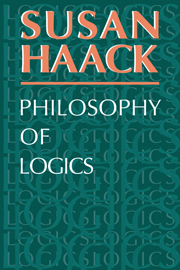Book contents
- Frontmatter
- ACKNOWLEDGMENTS
- Contents
- Preface
- Notation and abbreviation
- 1 ‘Philosophy of logics’
- 2 Validity
- 3 Sentence connectives
- 4 Quantifiers
- 5 Singular terms
- 6 Sentences, statements, propositions
- 7 Theories of truth
- 8 Paradoxes
- 9 Logic and logics
- 10 Modal logic
- 11 Many-valued logic
- 12 Some metaphysical and epistemological questions about logic
- Glossary
- Advice on reading
- Bibliography
- Index
8 - Paradoxes
Published online by Cambridge University Press: 05 June 2012
- Frontmatter
- ACKNOWLEDGMENTS
- Contents
- Preface
- Notation and abbreviation
- 1 ‘Philosophy of logics’
- 2 Validity
- 3 Sentence connectives
- 4 Quantifiers
- 5 Singular terms
- 6 Sentences, statements, propositions
- 7 Theories of truth
- 8 Paradoxes
- 9 Logic and logics
- 10 Modal logic
- 11 Many-valued logic
- 12 Some metaphysical and epistemological questions about logic
- Glossary
- Advice on reading
- Bibliography
- Index
Summary
The Liar and related paradoxes
The importance of the Liar paradox to the theory of truth has already become apparent; for Tarski's formal adequacy conditions on definitions of truth are motivated, in large part, by the need to avoid it. It is time, now, to give the Liar and related paradoxes some direct attention on their own account.
Why the ‘Liar paradox’? Well, the Liar sentence, together with apparently obvious principles about truth, leads, by apparently valid reasoning, to contradiction; that is why it is called a paradox (from the Greek, ‘para’ and ‘doxa’ ‘beyond belief’).
The Liar comes in several variants; the classic version concerns the sentence:
(S) This sentence is false
Suppose S is true; then what it says is the case; so it is false. Suppose, on the other hand, that S is false; then what it says is not the case, so it is true. So S is true iff S is false. Variants include indirectly self-referential sentences, such as:
The next sentence is false. The previous sentence is true. and the ‘postcard paradox’, when one supposes that on one side of a postcard is written:
The sentence on the other side of this postcard is false and on the other:
The sentence on the other side of this postcard is true.
Another variant, the ‘Epimenides’ paradox, concerns a Cretan called Epimenides, who is supposed to have said that all Cretans are always liars.
- Type
- Chapter
- Information
- Philosophy of Logics , pp. 135 - 151Publisher: Cambridge University PressPrint publication year: 1978
- 1
- Cited by



